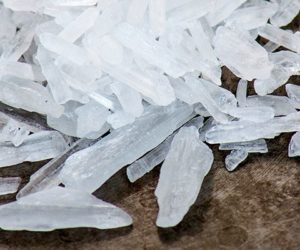Methamphetamine
 Methamphetamine is a Schedule II stimulant under the Controlled Substances Act. The potential for abuse is high. It has limited medical use. There is only one legal form of methamphetamine, known as Desoxyn. It is very limited to conditions such as obesity and ADHD (attention deficit hyperactivity disorder). All prescriptions are not refillable.
Methamphetamine is a Schedule II stimulant under the Controlled Substances Act. The potential for abuse is high. It has limited medical use. There is only one legal form of methamphetamine, known as Desoxyn. It is very limited to conditions such as obesity and ADHD (attention deficit hyperactivity disorder). All prescriptions are not refillable.
Common street names for methamphetamine:
- Batu
- Bikers Coffee
- Black Beauties
- Chalk
- Chicken Feed
- Crank
- Crystal
- Glass
- Go-Fast
- Hot ice
- Ice
- Meth
- Methlies Quick
- Poor Man’s Cocaine
- Quartz
- Shabu
- Shards
- Speed
- Stove top
- Super ice
- Tweak
- Uppers
- Yaba
- Yellow Bam
History of Methamphetamine and Trends
Most usage of methamphetamine is illicit and illegal except as outlined above. Methamphetamine hydrochloride was legally manufactured and for sale by prescription until the mid 60s. Large doses of methamphetamine or speed were abused during this time. Commercially-made for sale methamphetamine was withdrawn so a black market was born and the drug was illegally manufactured in meth labs.
Methamphetamine is still a popular drug of choice, concentrated in the Midwest, but still permeating all of the United States. As meth has gained popularity, the mixture of what is sold as meth has changed. Meth is mainly made with products containing pseudoephedrine. The Combat Methamphetamine Epidemic Act of 2005 makes sale of any non-prescription products containing pseudoephedrine, ephedrine, or phenylpropanolamine to be placed with products behind the counter or in a secured cabinet. Buyers must show identification and sign for the sale.
Effects of Meth Use & Symptoms
Low dose symptoms:
- Euphoria
- Elevated mood
- Sleeplessness
- Anxiety
- Irritability
- Rapid heartbeat
- Hyperthermia
High dose symptoms:
- Psychosis
- Brain Hemorrhage
- Heart Attack
- Stroke
- Death
Methamphetamine Abuse & Addiction
Methamphetamine has a high rate of addiction. The stimulation of the central nervous system occurs when the drug is smoked, swallowed or injected. Once consumed, the user experiences a “rush” as the drug sends powerful stimulation throughout the body.
Methamphetamine has become a common substitute for less accessible drugs like heroin and cocaine, as their euphoria and stimulating effects are similar.
The period of acute withdrawal effects, for a meth user who used casually, lasts six to eight months once usage ceases. For heavy users, acute withdrawal symptoms may last several years. Long-term meth users may experience ongoing psychosis, paranoia, schizophrenia, delusions and hallucinations.
Methamphetamine Withdrawal Process and Symptoms
Methamphetamine withdrawal has two formally recognized steps. The first 24 hour period the user experiences heavy drug cravings. The need to avoid a crash makes drug cravings for a stimulant concentrated in the beginning. Lengthy sleep also occurs as a user usually has been up for days at a time, the body craves much needed sleep.
Long term, the methamphetamine withdrawal can be lengthy and needs to be monitored. The first few weeks symptoms may not be as powerful as the first 24 hours, but may still be present and disconcerting. When withdrawal lasts months or years afterward, it is then an acute syndrome. The likelihood of entering the acute phase depends on how long and how much meth was consumed.
Short term withdrawal symptoms:
- Insomnia
- Drug cravings
- Carb food cravings
- Depression
- Hallucinations
- Delusions
Long term withdrawal symptoms:
- Anxiety
- Sleep issues
- Depression
- Confusion
Methamphetamine Treatment
Since methamphetamine cessation and treatment are potentially serious to the user’s well-being if it is not treated and monitored properly, the best choice is a treatment center with qualified professionals. First, a detox under medical supervision is necessary. Then, a combination of different therapies including good nutrition, behavioral therapy, medical supervision and supervised medications help a user become a person who maintains a meth-free lifestyle.
Don’t hesitate to call us at 877-855-3470 to discuss your needs or the needs of a loved one. Our health professionals are highly trained to provide the best care and assist you during this difficult time. Contact us so we can plan a course of treatment so addiction doesn’t have to be part of your life any longer.